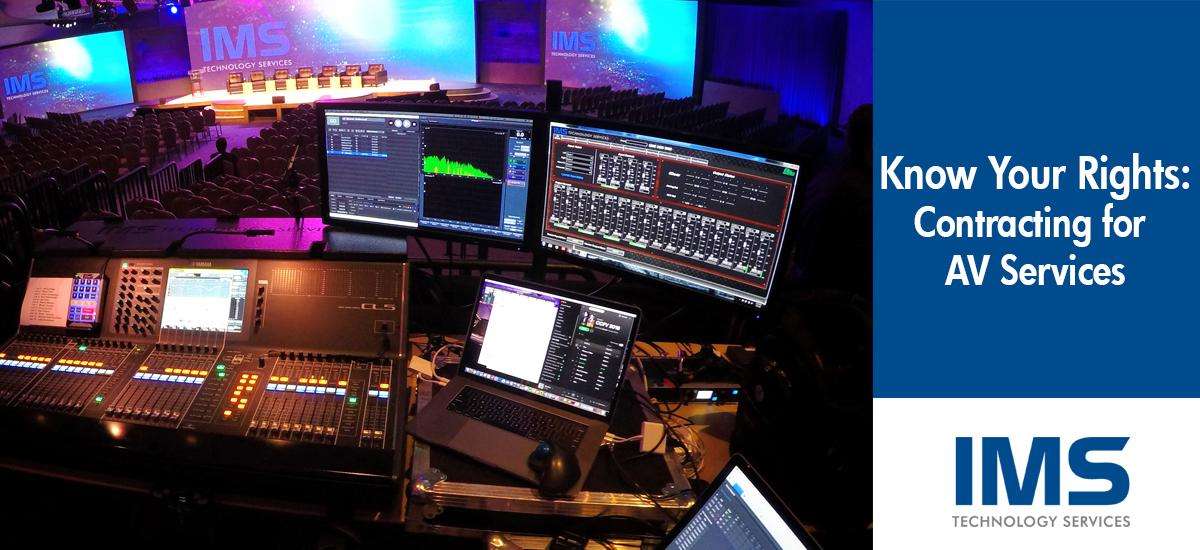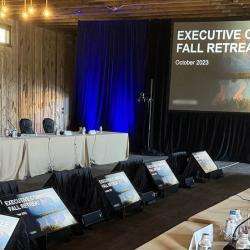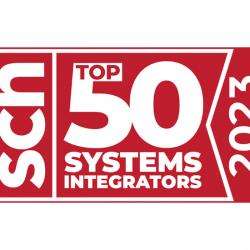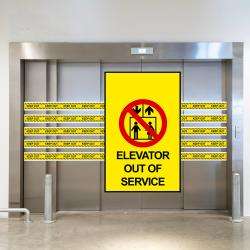Know Your Rights: Contracting for AV Service

Article written by Paul Wedesky, CMP, C.A.S.E., IMS Chief Operating Officer, Event Staging for MeetingsNet.com
Feeling pressured to use the “in-house” AV company at a hotel?
Ever been hit with fees for using an outside partner after you have signed a contract?
Not sure how to contract for WiFi service?
There are many in-house audio-visual organizations throughout the country that have a very good reputation for being fair in contract negotiations with their clients. But our clients often ask questions regarding charges and fees to use outside vendors, or have supervising staff in place to oversee any outside production, load-in, etc. Too often, our clients report that these stipulations and fees were disclosed to them after a contract had been signed.
The reality is that YOU as the CUSTOMER have rights during contract negotiations that allow you to CHOOSE your event partners and avoid excessive charges.
Disclose and Contract Early
If you are considering bringing in any third-party vendors for AV, décor supplies, furniture, technology, etc., ensure that you notify the venue during your RFP process and in advance of negotiations. These categories of services are often left out of the negotiation phase and can end up costing more due to added service charges if not disclosed during negotiations. If you decide to look at third-party options after contract signature, you may find that some quoted discounts may no longer apply because your overall venue spend is less or you may see additional fees for using an outside vendor.
If you intend to bring in any third-party providers, you’ll want to negotiate a third-party addendum, or ensure freedom of choice language in your initial contract to help avoid fees.
Negotiate Venue and AV Liaison Fees, Security Fees
Typically, these types of fees appear in contracts by the venue or in-house AV provider to ensure that their facilities and equipment are protected against damage and theft. This is a reasonable request. But, requiring your third-party provider to produce a standard Certificate of Insurance (COI) can often be an acceptable alternative. In-house AV providers may also require that a “liaison” be present to oversee load-in by an outside vendor if they are concerned about securing any permanently installed equipment in the venue. If you are planning on utilizing any of the installed equipment, this is also a reasonable request and fee. If this equipment is outside of the scope of work your event requires, be sure to have this red-lined in negotiations.
Do I Have to Pay for Rigging?
It is common for a venue to charge fees for rigging, or for requiring that all rigging is done by the in-house provider. You should ask about all rigging fees and policies before signing any contract so that you can budget accordingly. The agreed upon fee and requirements should also be part of your written contract with the venue so there are no surprises later.
Contracting for Internet
Internet service for your meeting has real value, and the labor and infrastructure that support reliable Internet service are not free, so paying a reasonable price for this service should be expected. Just like reviewing square footage and meeting room layout to ensure it will meet your needs, planners should have detailed information about the Internet infrastructure, performance, cost, and options before signing any venue contract. This information will help you decide if the in-house WiFi is cost-effective and will meet your needs, or if you should consider bringing in your own Internet connection. Your contract should specify the total cost of Internet service, and what you are receiving in return in terms of access, total bandwidth, speed, number of active connections, latency, etc.
Want to Know More?
We have created a "Know Your Rights: Contracting for AV Services" ebook that provides the tools you need to negotiate contracts that allow you flexibility and choice of event providers, including:
- Understanding why venues have these policies
- The key terms to look for in your contract, including rigging and storage
- A sample buyer’s rights clause for your contracts
- The 7 things you need to know before contracting for Internet
Download the ebook Now!
Share This Article
Categories
Latest Posts

INFOCOMM 2024: Our Top Takeaways for Higher Education

Looking for an alternative to in-house hotel AV?

A Cutting-Edge Solution for Law Firm Partner Meeting

IMS Technology Services Recognized as a Top 50 Systems Integrator

What happens when the freight elevator is unavailable for load-in?
Tags
Contact Us
- Headquarters: 3055 MCCANN FARM DRIVE, GARNET VALLEY, PA 19060
- Southeast Office: 404 SUNPORT LANE, SUITE 350, ORLANDO, FL 32809
- Phone: + 610-361-1870
- Contact Us
Services
Recent Posts

INFOCOMM 2024: Our Top Takeaways for Higher Education

